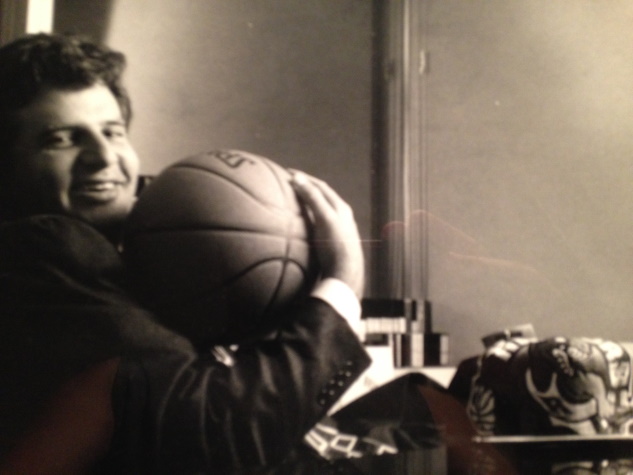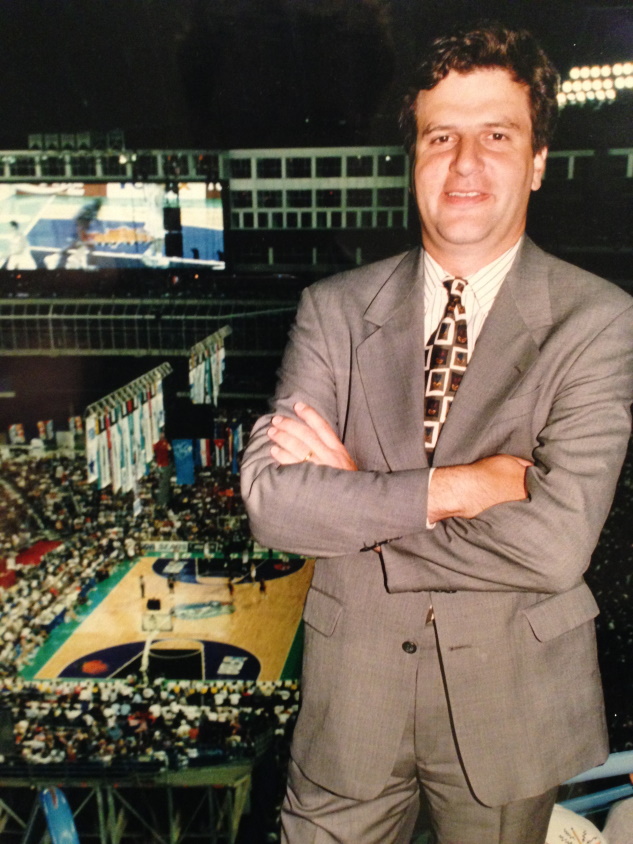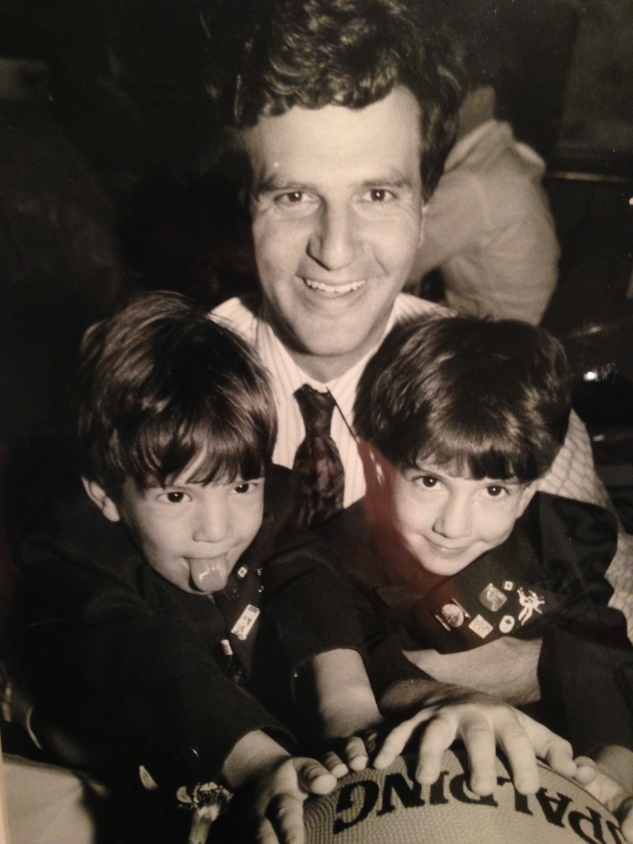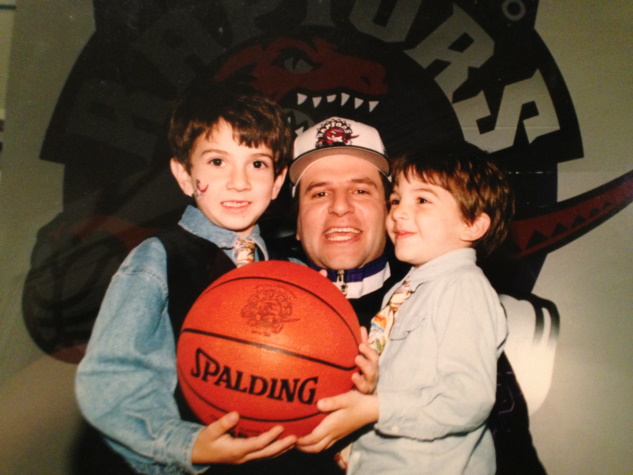Features
John Bitove (Indiana) shares how he brought the NBA to Toronto and why he believes in Sigma Nu
 On a June night in 2019, the streets across Toronto erupted in celebration as the game clock expired hundreds of miles away at Oracle Arena in Oakland, Calif., cementing the Toronto Raptors as champions of the 2019 NBA Finals. Millions of fans were kissing, hugging, high-fiving, honking horns, and screaming for joy throughout the city.
On a June night in 2019, the streets across Toronto erupted in celebration as the game clock expired hundreds of miles away at Oracle Arena in Oakland, Calif., cementing the Toronto Raptors as champions of the 2019 NBA Finals. Millions of fans were kissing, hugging, high-fiving, honking horns, and screaming for joy throughout the city.
Among the cheering masses of Toronto was John Bitove (Indiana).
“I had gone to the previous five games, but I wanted to be in Toronto to celebrate,” he shares. “I wasn’t here when the Blue Jays won the World Series, and I wanted to be a part of the celebration when it happened.”
And if it wasn’t for John Bitove, it might have never been.
Bitove, the son of Macedonian immigrants, grew up in Canada and in a family that embraced the Canadian version of the “American Dream.” Bitove’s father turned a 14-stool coffee shop into a restaurant empire, and his family emphasized the importance of working hard and working smart.
“My parents ensured I understood the value of a dollar,” he says. “We all had to work at young ages at summer jobs. My mom would take me to the bank to deposit my newspaper route earnings and would show me how interest was added to my account. If you want to enjoy things, you have to work hard for it.”
Bitove’s family placed high importance on people and relationships. “They taught me about respecting your fellow people. If you don’t respect people, you can’t expect them to do the same.”
Bitove’s mother was originally from Northern Indiana, so when it came time to consider colleges, a walk-on invitation from Indiana University sealed the deal for him. He competed in track and field his first semester, then played spring football.
His love of sports attracted him to the Beta Eta Chapter on campus, which featured a roster of Sigma Nu athletes who had won national awards in various sports. After meeting the brothers, it quickly became an easy decision to join.
“As I get older, some of my best years were at IU, and I’d give anything to relive those days with those guys,” he reflects. “I’ve stayed in touch with many of them today.”
Bitove is quick to note the positive impact of Sigma Nu on his collegiate experience and what the Fraternity taught him during those years. He credits the Fraternity for instilling in him leadership qualities, time management skills, communication skills, the importance of community service, and, of course, brotherhood.
“I think fraternities and sororities are an important part of post-high school development. Anyone can make friends – you don’t need a fraternity for that. But it’s living together and accepting the differences in people and working together to get things done. Those are all important tools for after you graduate.”
 Bitove also emphasizes the impact his mentors in Sigma Nu had on him during those formative years.
Bitove also emphasizes the impact his mentors in Sigma Nu had on him during those formative years.
“We had a great Commander during my freshman year in Steve Bail who showed really good judgment on how to handle tough issues,” he says. “Seeing that as a freshman provided some good life lessons to have.”
After graduating from IU, Bitove earned a law degree from the University of Windsor and then worked for a stint at a prominent law firm in Ottawa, Ontario. His time in the Canadian capital brought him into the political orbit. Eventually, he served in the office of the Deputy Prime Minister, arguably the second-most powerful politician in Canada.
By 1993, Bitove had returned to Toronto and was poised to make his mark in his hometown’s history.
“Basketball is a way of life in Indiana, and I knew when I came back to Toronto that the city was big enough and strong enough to have an NBA team.”
He spearheaded an aggressive campaign to bring an NBA team to Canada. The lessons he had learned from his parents and Sigma Nu carried him through a whirlwind effort that included meeting personally with every NBA team owner. Bitove’s hard work paid off, and in 1993 it was announced that the Toronto Raptors would become the NBA’s 28th franchise for an expansion fee of $125 million.
But two major hurdles awaited Bitove and his partners.
The first issue was presenting a professional basketball product in a city that considered itself the capital of hockey. “When I grew up, we were the only house with a basketball hoop,” he recalls.
The Raptors first focused on building a culture of basketball. They developed youth leagues and made community outreach a priority. They had to foster an appreciation for basketball and a complete understanding of it.
Their second focus was on providing an outstanding experience for fans.
“Look at Nashville with the Predators (NHL team),” he says. “They make each hockey game a whole event. Same thing with Raptors games. We had to make it a whole experience. We had to do basketball one step better than hockey.”
The second issue was providing a modern arena. At the time, the trend was for major sporting venues to be located on the outskirts of cities where land was cheaper. The Raptors flipped that paradigm upside down by being the first modern arena, now known as Scotiabank Arena, right in the heart of Toronto on what was once a former postal sorting station.
“It was a lot of work and a lot of details to get a privately financed arena done,” he shares of that time. “At the end of the day, it’s not unlike someone building a house. It’s just bigger and a lot more complicated.”
The arena would also become the home of the Toronto Maple Leafs and serve as the hub for sports and entertainment for Toronto.
Bitove sold his stake in the Raptors in the late 90s, but his passion for sports and his home didn’t wane. He was the architect of Toronto’s bid to host the 2008 Olympics and has been a key volunteer for the World Athletics Indoor Championship and the International Basketball Federation’s World Championship. For Bitove, sports play a critical role in society.
“Like most democracies, Canada is an incredibly diverse country, and sports is about the easiest way to unify people from different backgrounds and beliefs. It doesn’t matter what your background is. When your team is competing, you support them. As a society, we put a huge value on sports as a mechanism to participate and communicate with each other. Where would the collegiate system be without athletic programs? Would affinity still be high?”
 Harkening back to his time at Beta Eta and the importance of community service, he has channeled his passion into the S’Cool Life Fund, a nonprofit that focuses on funding extracurricular activities for kids.
Harkening back to his time at Beta Eta and the importance of community service, he has channeled his passion into the S’Cool Life Fund, a nonprofit that focuses on funding extracurricular activities for kids.
“There’s no point in making money if you’re not going to share it with your family and your community,” he says. “One of the things I noticed twenty years ago was that extracurricular programs were suffering.”
As a product of the Ontario public school system, Bitove wanted to help raise funds to support these programs.
“Education is the lifeblood of any society, and extracurriculars are where you learn teamwork and all of those soft skills that are so important for kids to develop and practice.”
Today, S’Cool Life Fund provides resources for programs to purchase everything from soccer balls to team jerseys.
Along the way, he’s continued to surround himself with people cut from the same cloth like Mark Cuban and Isaiah Thomas. “Winners need to surround themselves with winners because that’s how you stay focused on success.”
But even with his expansive network of NBA owners, prominent business figures, and star athletes, Bitove hasn’t strayed from being his authentic self.
“The John Bitove I knew at IU is the same John Bitove I know today,” says Vice Regent Steve Ratterman (Indiana). “Success has not changed anything.”
Bitove’s story is a perfect example of the positive impact that Sigma Nu can make in a man’s life and its role in preparing him for success. So much so that both of his sons are Sigma Nu alumni from Lambda Alpha (Wake Forest) Chapter.
While he insists it was their decision, he doesn’t hesitate to reiterate that he believes in Sigma Nu’s mission.
“The Sigma Nu experience absolutely transcends generations, and it’s why the experience is so important and has continued on for so long, because it’s a positive tool in a man’s personal development.”
